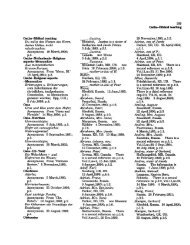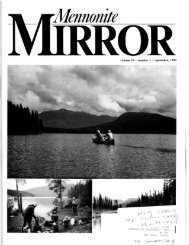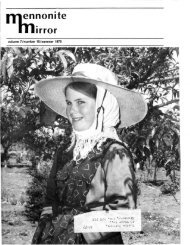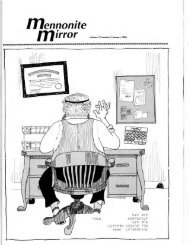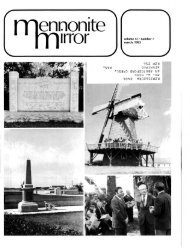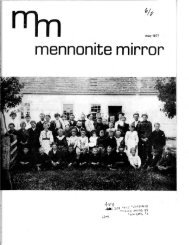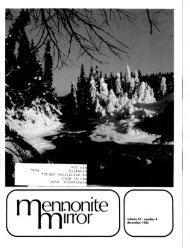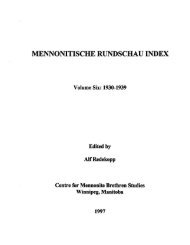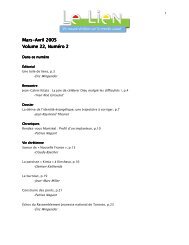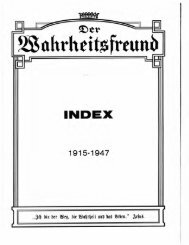SOPHIA - Canadian Conference of Mennonite Brethren Churches
SOPHIA - Canadian Conference of Mennonite Brethren Churches
SOPHIA - Canadian Conference of Mennonite Brethren Churches
You also want an ePaper? Increase the reach of your titles
YUMPU automatically turns print PDFs into web optimized ePapers that Google loves.
2lnabaptist ~omm<br />
Faith Hidden Until the<br />
Time <strong>of</strong> Harvest<br />
by Linda Huebert Hecht<br />
~ he month <strong>of</strong> September signals a new season, a time<br />
~to harvest summer's bounty and prepare for winter.<br />
The changes in nature parallel the seasons <strong>of</strong> our lives. At<br />
times the season <strong>of</strong> harvest brings the unexpected, something<br />
hidden until its time has come. That is perhaps what<br />
certain Anabaptist women felt who were arrested in the<br />
Austrian region <strong>of</strong> Tirol in the fall <strong>of</strong><br />
1529. They had managed to keep their<br />
new found faith hidden from the<br />
authorities up to that time. The seed<br />
<strong>of</strong> faith had been planted earlier and<br />
they had known the risks involved in<br />
being baptized as adults, that their<br />
choice could lead them to prison and<br />
away from their families. But now the<br />
time had come to reveal their beliefs publicly to the world<br />
as they knew it. Staunch and true, the majority <strong>of</strong> them did<br />
not turn back, some ready to sacrifice all they had.<br />
Altogether, the cases <strong>of</strong> twenty-five women were discussed<br />
in the various reports from the different levels <strong>of</strong><br />
government (court records) during the fall <strong>of</strong> 1529. * For<br />
most <strong>of</strong> these women it was the first time they were<br />
arrested. The persecution <strong>of</strong> Anabaptists had begun<br />
already in this region late in 1527, reaching a peak in the<br />
Spring <strong>of</strong> 1528 with 33 arrests during the month <strong>of</strong> May<br />
alone. A greater number <strong>of</strong> arrests took place in the spring<br />
and the fall seasons. In winter it was harder for the authorities<br />
to negotiate the hillsides and secluded valleys <strong>of</strong> this<br />
region in order to apprehend people, and in summer farming<br />
families were <strong>of</strong>ten absent from the villages while<br />
grazing their animals on the higher slopes.<br />
In total, more than 130 Anabaptist women were<br />
accused <strong>of</strong> heresy during 1528, and in the following year<br />
the number was almost as high, with 123 Anabaptist<br />
women facing arrest. In the fall <strong>of</strong> 1529 the numbers were<br />
again at a peak. Earlier that year Charles V had outlawed<br />
Anabaptism throughout the Holy Roman Empire. Perhaps<br />
this is why his brother Ferdinand, who ruled Austria, now<br />
increased the persecution <strong>of</strong> the women and men who had<br />
8 <strong>SOPHIA</strong> / WISDOM<br />
9t times the season <strong>of</strong> harvest<br />
brings the unexpected,<br />
something hidden until its<br />
time has come.<br />
stepped outside the bounds <strong>of</strong> what he called 'the one holy<br />
christian church! Choosing to be re-baptized as an adult on<br />
the confession <strong>of</strong> your faith was not just unpopular in sixteenth<br />
century Tirol, it was illegal and punishable by<br />
death. Many <strong>of</strong> us have attended a number <strong>of</strong> baptisms.<br />
But never do they carry the threat <strong>of</strong> arrest and a possible<br />
martyr's death because <strong>of</strong> our beliefs,<br />
at least not in Canada. Such were the<br />
conditions under which our foremothers<br />
joined the sixteenth century<br />
Anabaptist Church.<br />
Six times during September 1529<br />
various groups <strong>of</strong> Anabaptist prisoners<br />
included women. Space does not permit<br />
us to discuss them all. A few<br />
details concerning some <strong>of</strong> them must suffice.<br />
The urgency <strong>of</strong> the harvest made it necessary to discuss<br />
the case <strong>of</strong> Ursula Kuen on the first day <strong>of</strong> September,<br />
1529. As the widow <strong>of</strong> Caspar, the silversmith, who already<br />
had been executed as an Anabaptist, Ursula possessed<br />
some property, which the government now had to appropriate<br />
if they were to acquire the income from the crops in<br />
the fields. Ursula was also an Anabaptist and had no intention<br />
<strong>of</strong> relinquishing her faith. Moreover, she adamantly<br />
declared that her two youngest daughters had not been<br />
baptized as infants. Having made these declarations, it is<br />
understandable that she fled from her home. She left<br />
behind a house in the town <strong>of</strong> Rattenberg, a garden outside<br />
the town and two <strong>of</strong> their workers. Her share <strong>of</strong> the property<br />
would be passed on to her children, but her<br />
whereabouts remained a mystery to the authorities. Perhaps<br />
she joined other Anabaptist believers in the safety <strong>of</strong><br />
Moravia.<br />
The testimonies <strong>of</strong> three women imprisoned in the<br />
city <strong>of</strong> Hall near Innsbruck, dated September 7, revealed<br />
significant details to the authorities about Anabaptist activities<br />
near there. Katherina Praun, Dorothea Maler and Anna<br />
Ochsentreiber (her husband likely herded oxen) were<br />
found guilty, and while Katherina chose to recant, the



